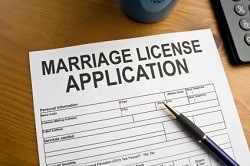 In order to marry in New Jersey, you must first apply for a marriage license. The marriage license must be applied for in the hometown of the bride, however, if the bride does not live in New Jersey then the license should be applied for in the hometown of the groom. In the event that neither the bride nor groom lives in the state of New Jersey, then the marriage license must be applied for in the town where they wish to marry. There is a 3 day waiting period for a marriage license and it is valid for 30 days from the date of issuance.
In order to marry in New Jersey, you must first apply for a marriage license. The marriage license must be applied for in the hometown of the bride, however, if the bride does not live in New Jersey then the license should be applied for in the hometown of the groom. In the event that neither the bride nor groom lives in the state of New Jersey, then the marriage license must be applied for in the town where they wish to marry. There is a 3 day waiting period for a marriage license and it is valid for 30 days from the date of issuance.
In order to marry in New Jersey, both parties must be over the age of 18. If the bride and/or groom is under the age of 18, then they must have parental consent that is given in front of two witnesses. If either party is under the age of 16, they may marry with the consent of both parents and/or permission from a judge. Younger parties can marry in the event of a pregnancy or birth of a child.
The marriage ceremony may be performed by any federal, state or municipal judge or magistrate, including those who are retired, as well as any county clerk, a mayor or deputy mayor of a town, chairman of any township committee and any religious minister or clergyperson. The officiate of the wedding ceremony must file the completed license within 5 days of the wedding to the county clerk that issued the license.
The State of New Jersey does allow cousin marriages. New Jersey does not validate or recognize same-sex marriages, common-law marriages or marriages by proxy. Same sex couples can apply for domestic partnership if they are over the age of 18 and can prove joint financial obligations. Domestic partnership can also be applied to couples of opposite sex who are over the age of 62.














